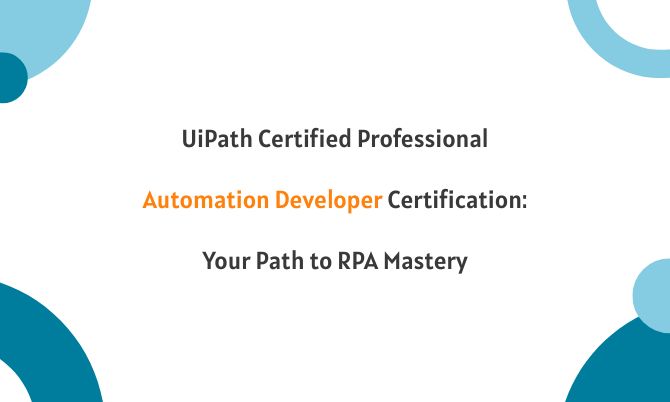UiPath offers a structured certification path designed to validate and showcase your automation expertise. The UiPath Certified Professional Automation Developer program consists of two key certifications: Automation Developer Associate and Automation Developer Professional. Together, they provide a comprehensive pathway from foundational skills to advanced RPA capabilities.

The UiPath Certified Professional Automation Developer Associate certification is the starting point for aspiring RPA professionals. It is designed for individuals who are beginning their journey in automation and wish to demonstrate their ability to design and build simple automation solutions independently or as part of a team.
Target Audience: Entry-level RPA developers, students, and professionals new to UiPath.
Problem-solving and process identification Building simple automation solutions using UiPath Studio Understanding the basics of UiPath Robots and Orchestrator
Exam Format: Multiple-Choice, Drag and Drop, and Simulation-Based questions
Role Readiness: Candidates are expected to:
Work independently on straightforward automation tasks Collaborate within automation teams on more complex projects
Career Progression: Serves as the foundational step towards becoming an Advanced Automation Developer, Solution Architect, or Automation Architect.
The UiPath Certified Professional Automation Developer Professional certification is intended for experienced RPA developers who want to validate their ability to create complex automation solutions, particularly using the Robotic Enterprise Framework (REFramework).
Target Audience: Advanced developers, technical leads, and automation architects with extensive hands-on experience.
Designing and independently developing robust, production-level automation solutions Deep understanding of UiPath Studio, Robots, Orchestrator, and the REFramework Leading or mentoring teams in developing scalable automations
Exam Format: Multiple-Choice, Drag and Drop, and Simulation-Based questions
Role Readiness: Certification holders are equipped for roles such as:
Advanced Automation Developer Solution Architect Automation Architect
Earning a UiPath Certified Professional credential provides multiple benefits:
Career Growth: Certifications validate your expertise, making you a more competitive candidate for RPA roles.
Industry Recognition: UiPath credentials are globally respected in the automation industry.
Skill Validation: Demonstrates your ability to effectively use UiPath tools in real-world scenarios.
Progressive Pathway: A clear learning and certification path from associate to professional levels.
Whether you're aiming for the Associate or Professional level, thorough preparation is key. Here are some tips to help you succeed:
Understand the Exam Objectives
Review the official exam guide from UiPath to understand the skills being tested. Focus on core concepts such as selectors, variables, arguments, control flow, and UI automation.
Gain Hands-On Practice
Use UiPath Studio regularly to build real-world projects. Explore automation scenarios involving Excel, email, web scraping, and PDF automation. Practice implementing the REFramework if you're targeting the Professional certification.
Use UiPath Academy
UiPath Academy offers free, structured learning paths that align with both Associate and Professional certification goals. Take all relevant learning plans and assessments to solidify your understanding.
Take Real Exam Questions
Use Uipath real exam questions from Testpassport to get used to the question format and identify knowledge gaps.
Join the Community
Participate in the UiPath Forum and RPA communities to ask questions, share knowledge, and stay updated with best practices.
Whether you're just starting in the world of RPA or you're an experienced developer aiming to showcase your advanced skills, UiPath’s certification track offers a robust and industry-recognized roadmap. Begin with the Automation Developer Associate to build a strong foundation, and elevate your expertise with the Automation Developer Professional to master enterprise-level automation.